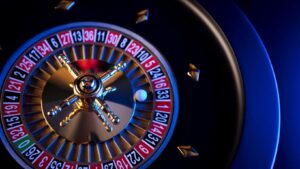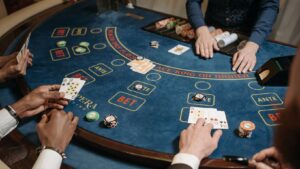Table of Contents
ToggleWriters have always been drawn to chance. From the tragic coin toss in No Country for Old Men to Dostoevsky’s obsessions in The Gambler, fiction thrives on the tension between fate and decision. Every story, at its core, is a game of risk: characters act, consequences unfold, and the outcome teeters between triumph and disaster.
In 2025, that fascination has found a new form. What once lived on the page now lives in pixels. The modern stage for human unpredictability isn’t the casino floor or the poker table; it’s the digital screen.
The Old Seduction of Luck
There’s something timeless about watching the dice roll or the cards turn. Ancient storytellers used luck as a mirror for human nature, a way to reveal our hunger for control in an uncontrollable world.
In Greek myths, the Fates literally spun human lives like threads, cutting them at random. Medieval poets warned that Fortuna’s wheel would always turn, sometimes lifting kings, sometimes crushing them beneath its weight. Even Shakespeare filled his plays with wagers, both literal and moral.
The truth hasn’t changed much. We still crave the moment where logic gives way to luck, that instant of surrender that makes the outcome feel like destiny.
The Digital Arena of Risk
Today, technology has given that ancient impulse a new form. Modern gaming platforms and online entertainment spaces enable people to test probability with a click, rather than a coin toss.
What’s fascinating is how these systems still echo the oldest literary themes: temptation, courage, greed, patience, and redemption. The tools are digital, but the emotions are ancient.
And just as literature evolves through eras and genres, so too does gaming. New platforms merge technology, transparency, and community, transforming what used to be pure chance into a study of decision-making itself. Some of the most forward-thinking examples can be found at bettingstake.in, where innovation in crypto and data-driven betting meets the timeless art of human risk.
It’s not gambling in the old sense of smoky rooms and secrecy; it’s participation in a global story of probability and choice.
Why Writers Understand Risk Better Than Anyone
Writing a novel is a kind of wager. You risk time, ego, and uncertainty in exchange for a sense of meaning. The odds are brutal, the outcome unpredictable, but you do it anyway. That’s the human pattern.
Every sentence is a bet on rhythm. Every plot twist gambles on reader trust. You push the story upward, just like a player stacking their winnings, until the structure trembles under its own suspense.
That’s why writers, perhaps unconsciously, have always admired gamblers. Both chase the same elusive high: not the win, but the possibility of it.

Stories as Games of Strategy
Literature and gaming share another trait: both reward pattern recognition. A reader spots foreshadowing like a player senses momentum. Both feel that tickle of intuition, something’s about to happen.
In modern storytelling, this has evolved into interactive fiction and narrative games. Players make moral decisions that alter the outcome, blurring the distinction between the reader and the author.
Technology didn’t replace storytelling; it expanded it. Just as early gamblers invented odds tables, developers now design branching storylines where consequence and chaos dance together.
The Moral Dimension of Chance
Every discussion of risk eventually hits a moral wall. Is it wrong to chase luck? Dangerous to court uncertainty? Writers have asked those questions for centuries, long before they appeared in government regulations or academic papers.
The answer, like most things in art, depends on intention. Risk without awareness becomes self-destruction. However, risk, with reflection, in fiction or gaming, becomes philosophy. It’s how humans explore agency and consequence safely, within systems that contain the chaos.
The difference between a tragic character and a wise one is rarely the outcome; it’s how they face the uncertainty.
Why We Keep Playing
At heart, both literature and gaming are about agency. Readers want to know if characters can change their fate. Players want to know if their choices matter. And we, as humans, never stop testing the boundaries of our influence in an unpredictable world.
That’s what makes the intersection of art, technology, and gaming so fascinating. It’s not about escape, it’s about simulation. Both novels and digital games provide us with opportunities to practice courage, restraint, and decision-making in miniature.
And when the round ends, when the final chapter closes, we’re reminded of the same truth writers have known for centuries: the story isn’t about winning. It’s about playing with awareness.
Final Thoughts
From the dice cups of ancient temples to the keyboards of modern players, risk has always been humanity’s favorite metaphor. We roll, we rise, we fall, and we tell stories about what we learned along the way.
The platforms have changed, but the psychology remains the same. We still look for patterns in chaos, meaning in randomness, and redemption in loss.
In the end, whether you’re reading a novel or watching the odds play out online, you’re part of the same human experiment, one where every choice carries weight, and every risk, no matter how small, tells a story.




